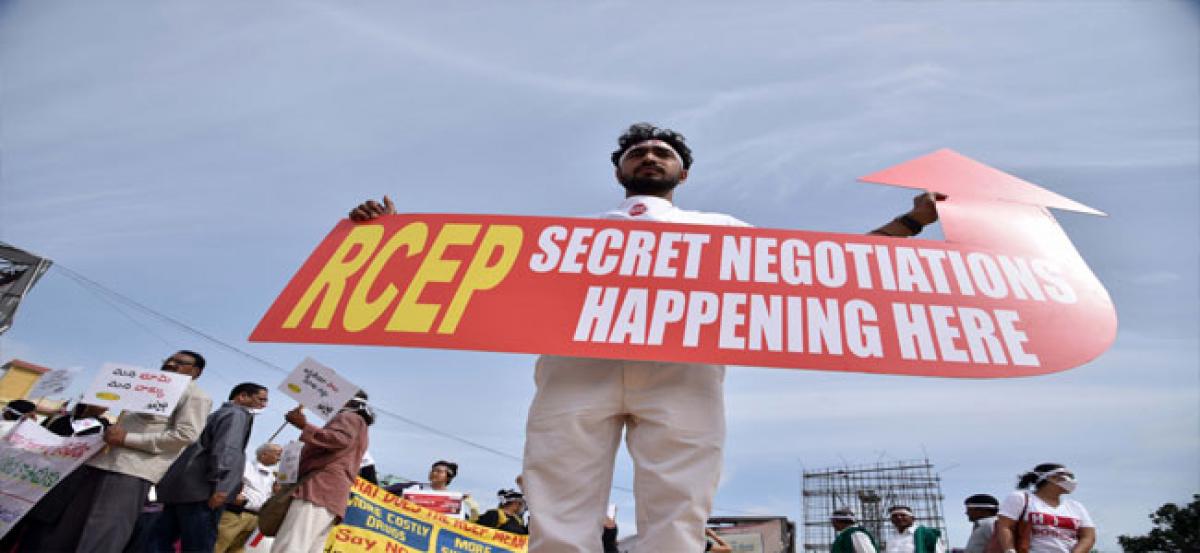Live
- Varun Dhawan pushes his physical limits for ‘Baby John’ stunts
- Sonu Sood in Kolkata for ‘Fateh’: A Warm Embrace with the City of Joy
- SRK’s heartfelt confession about never visiting Kashmir until 2012
- Generate top 5 Tags from the below article, mention them with commas beside by beside
- Telangana CM Criticises Allu Arjun Over Theatre Incident
- Marco Movie Review: An Action-Packed Thriller with Intense Fight Sequences
- Shruti Haasan exits ‘Dacoit’ over uncomfortable work conditions
- Aaron Taylor-Johnson Shares Intense Fitness Journey for Kraven the Hunter
- Hina Khan embraces December with style
- Sandhya Theater Stamped: Akbaruddin Demands Investigation, Revanth Reddy Assures Action
Just In
Women up in arms against Regional Comprehensive Economic Partnership


RCEP and other similar free trade agreements are in reality, the legal contract to give multinational corporations rights to destroy traditional livelihoods and lifestyles of indigenous communities.
Hyderabad: At a rally held in the city on Monday, women from different parts of India marched along with other marginalised communities to protest the Regional Comprehensive Economic Partnership (RCEP), the mega Free Trade Agreement which is currently being negotiated in India.
The women’s groups working on farmers’, Dalits’, land rights, national resource rights, indigenous womens’, minorities’, fisherwomen's, labour rights and other human rights concerns, strongly opposed RCEP seeing it as a reinforcement of the destructive development model that the existing free trade agreements and the policies of liberalisation, privatisation and globalisation have inflicted upon the world’s poor, particularly on poor women.
Burnad Fatima from Federation of Women Farmers Rights, Tamil Nadu and APWLD member said, “Women farmers are going to be the worst affected by this free trade agreement. Land grabbing for corporate agriculture will impact our food sovereignty, rights over our land and seed preservation. It will force women to migrate to seek labour and become vulnerable to trafficking.”
“RCEP and other similar free trade agreements are in reality, the legal contract to give multinational corporations rights to destroy traditional livelihoods and lifestyles of indigenous communities.
Indigenous women as the tradition keeper of their community’s local knowledge, seed, biodiversity and food sovereignty will lose their control as RCEP will put these knowledge and biodiversity into the hands of corporations under the guise of intellectual property,” said Banamallika Choudhury,
Women’s Rights Activist and APWLD partner “It is deeply concerning that this trade agreement directly impacts women, but is not being discussed in Parliament, State Assemblies, or at Panchayat and Municipality levels,” said Albertina Almeida, APWLD member a lawyer and activist from Goa.
It is worrying that negotiations which have a bearing for the people/communities, are conspicuously shrouded in secrecy, she added.
Kate Lappin, Regional Coordinator of Asia Pacific Forum on Women, Law and Development (APWLD) added, “The RCEP and other trade agreements give multi-national corporations the right to govern at the expense of women’s livelihoods, the environment and democracy. A system that allows corporations to sue governments when they attempt to regulate
corporations, protect the environment, provide public services or protect public health is a corporatocracy, not a democracy. Women have been at the heart of the movements to stop other trade agreements like the TPP and to halt the deadly advances of the WTO. We will use the same solidarity to stop the RCEP. ”
The women’s groups urge the Indian Government to stop negotiating a trade agreement based on US model of
corporate trade and move to a people’s trade agreement that truly advances Development Justice.

© 2024 Hyderabad Media House Limited/The Hans India. All rights reserved. Powered by hocalwire.com






